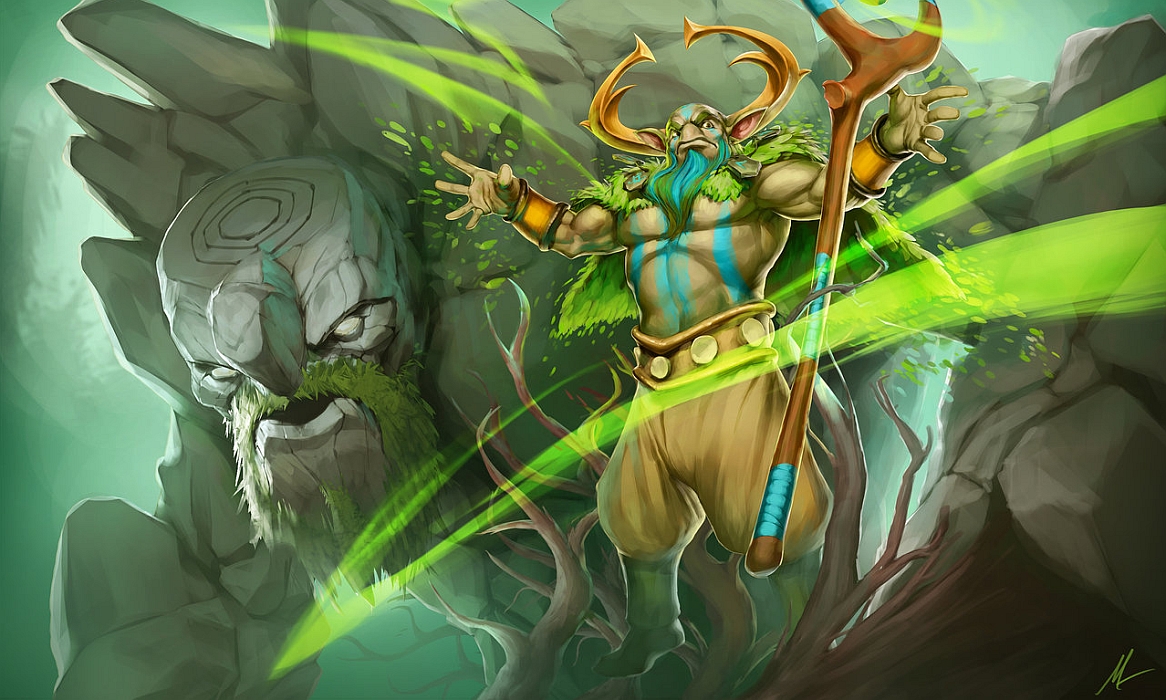Learning to communicate more effectively in Dota 2

Click here for his DeviantArt page
Every week, Chris documents his complex ongoing relationship with Dota 2 and wizards in general. To read more Three Lane Highway, click here.
Last week I wrote about the attitudes that can hold people back from improving their Dota 2 game. This week I want to return to the topic of communication from a different angle. When you're playing solo, trying to build a rapport with your team is one of the most difficult things to do but also the most important. It's hard, in part, because it's easy to ignore: to believe that if you just keep your head down, stay quiet and play then nothing bad can happen. This is an understandable approach, but not the ideal one. Team chat is there for a reason.
Actually talk
This is the first step, and something I have to keep reminding myself. Taking the first step and being active in team chat makes it easier for other reasonable players to step forward. Everybody's been burned in Dota at one point or another, and everybody considers staying silent just to avoid the flames. In my experience, you're far more likely to be matchmade with other reticent chatters than you are with genuine assholes. As soon as you establish that you're not a dick, you'll find out that lots of the people on your team aren't dicks either.
Something simple like "which lane do you want?" during hero selection makes it clear that (a) you're willing to cooperate and (b) you're invested enough in the game to start strategising. This promotes good behaviour in other people, and—if at least a few of your teammates feel like you've got their back—shields you against rage from the minority later on.
I find that the positive impact of being vocal increases if you're willing to use in-game voice, but it's completely reasonable to avoid it. If you worry that you'll have a bad experience if other players hear your voice, use text: it's still a huge benefit, and there's no reason to make yourself uncomfortable.
Give compliments
'Well played!' is one of the most useful commands you can place on your chat wheel. If somebody does well, say so. If somebody does really well, call them out specifically—"gj tusk". This makes people feel respected and, as a consequence, they're more likely to regard you positively. A few players are arrogant enough to respond to "wp" with "yep", but they're in the minority. If you manage to achieve a reciprocal "wp"—where they compliment you as you compliment them—congratulations! You've made a friend and, if things get rough later on, your team is less likely to tilt and throw.
As somebody who plays a lot of position five in ranked, my favourite approach is to congratulate our midlaner every time a mid gank goes well. It doesn't matter if they played particularly well or not: if the kill happened, it's an opportunity to form a bond. That bond will be extremely helpful later on, as blame tends to fall on either the midlaner or support when things go south. If you're willing to back each other up, it can hold the team together.
Keep up to date with the most important stories and the best deals, as picked by the PC Gamer team.
Explain, but never get personal
I've spent a lot of time trying to figure out how to respond to insults. Anybody who says 'noob' without irony isn't worth responding to: it can be fun to simply send a '
It gets more complicated if a player is actively accusing you of doing something you didn't do. For example: in my last solo ranked game, a rough midgame left me underlevelled. As a position five Rubick against Silencer, I was struggling to survive the opening moments of each teamfight and as a result I wasn't picking up enough XP. This is definitely my error and something that fell to me to fix.
As the enemy was knocking on our tier three towers, however, our carry decided to blame me—claiming that I'd ruined his game by hanging around in lane soaking XP and become underleveled as a result. This was flat-out untrue, but our offlaner decided to agree with him anyway. Rather than get personal about it, I pointed out that I'd ganked mid twice, stacked our jungle, and pulled—that time in-lane accounted for a very small part of my early game. Because I'd established a decent relationship with our midlaner (see above), he backed me up. The carry didn't press the point any further, I got a handle on my dying-too-much problem, we turned the game around and won.
Always suggest actions
It's a very good idea to frame everything you say as a suggestion. "We need wards" is bad; "I'm going to ward" is good, as is "come with me so you can place wards safely." Similarly, "Lina invis" is okay: "Lina invis bot, get back" is better. If you express yourself in a way that is both detailed and clearly communicates the action that needs to happen, that action is more likely to happen. As a bonus, it becomes harder for bad-attitude teammates to complain that they weren't give enough warning about an incoming gank, too.
The exact opposite of this approach is context-free pinging. Pinging is, a lot of the time, meaningless—or it's exactly as meaningful as Lassie barking. You might figure out that little Timmy has fallen down the well eventually, but Timmy would probably be better of if Lassie could, you know, talk. Much as "Timmy down well help" is more quickly understood than "WOOF WOOF WOOF WOOF", "Tusk shadow blade DD rune mid" is better than PING PING PING PING PING PING PING.
Suggesting action is also a good way to start turning a game around when the team has started to tilt. Staying calm and useful means saying "defend together" rather than "just back pls"; "lets go deward rosh" beats pinging the Roshan pit helplessly.
When other people suggest action, and those actions are a good idea, don't just silently comply: if you let people know that you're on your way, or that your teleport scroll is on cooldown for another 10 seconds, you create better understanding and a stronger sense of cooperation. This, again, makes people feel like their suggestions are being respected. It's respect, at the end of the day, that holds teams together and wins matches.

PC Gamer Pro is dedicated to esports and competitive gaming. Check back every day for exciting, fun and informative articles about League of Legends, Dota 2, Hearthstone, CS:GO and more. GL HF!
Joining in 2011, Chris made his start with PC Gamer turning beautiful trees into magazines, first as a writer and later as deputy editor. Once PCG's reluctant MMO champion , his discovery of Dota 2 in 2012 led him to much darker, stranger places. In 2015, Chris became the editor of PC Gamer Pro, overseeing our online coverage of competitive gaming and esports. He left in 2017, and can be now found making games and recording the Crate & Crowbar podcast.


